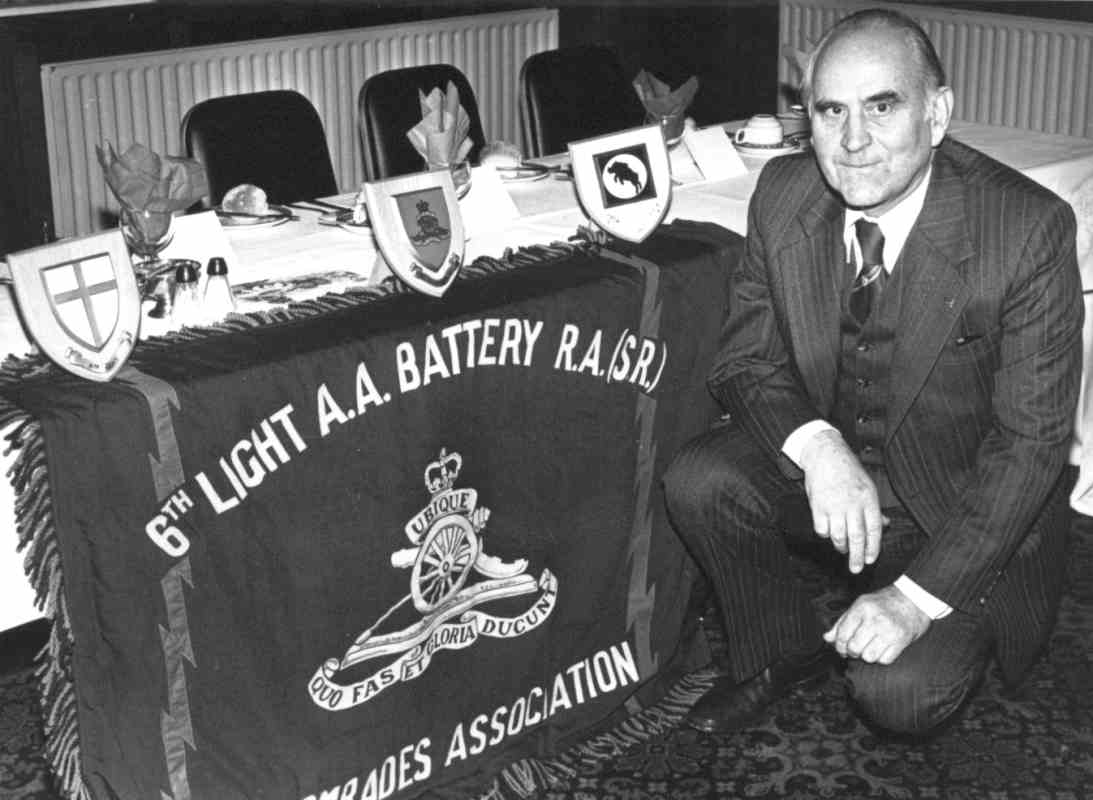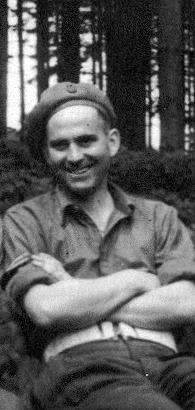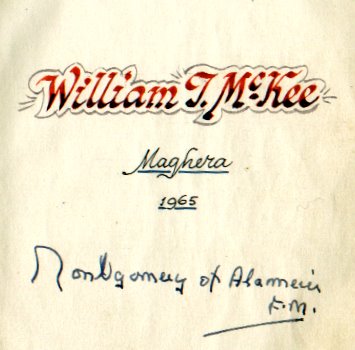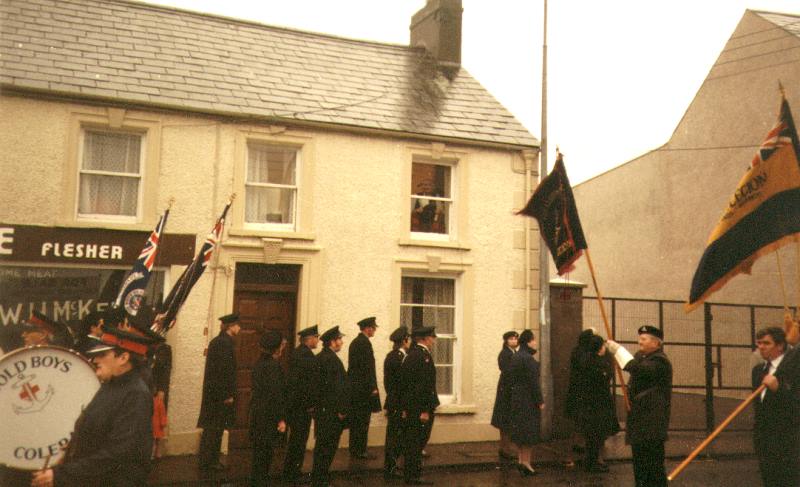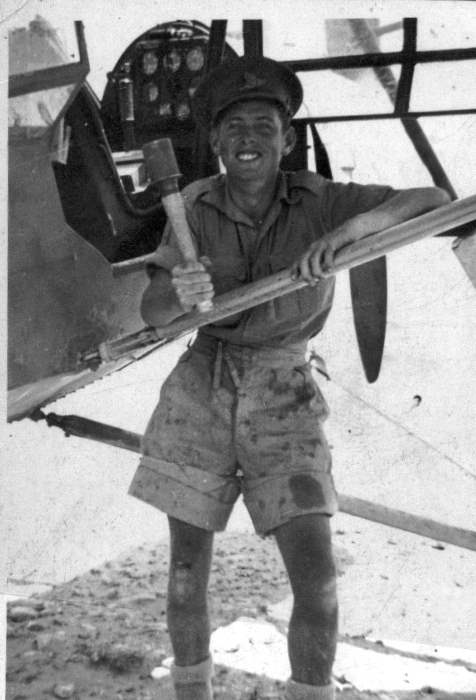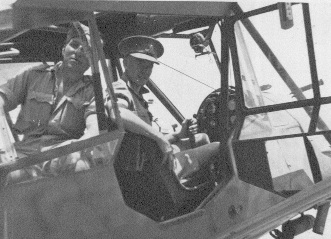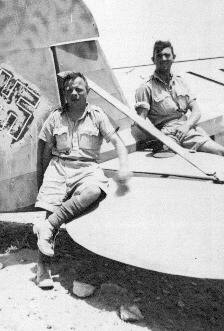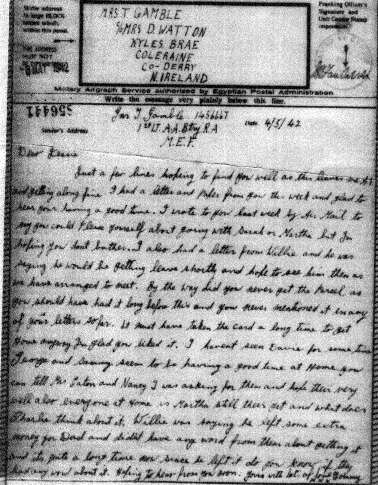The Coleraine
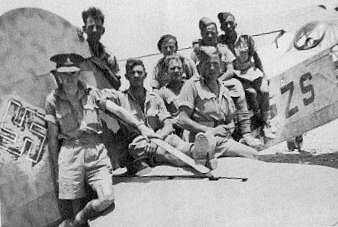
1939 - 1945
Introduction The
effectiveness of any fighting unit is determined by the competence of its
supporting units. The fighting unit must reach the battle field fully trained,
equipped and supported. In this section I will discuss the daily routines as
well as the support units that kept the
Discipline - Rank Structure - Catering - Pay - Training - Accommodation - Transport - Maintenance - Medical Cover - Hygiene - Dress - Security - Sport - Welfare - Religion - Enemy Munitions - Mail
Discipline "Army
discipline was out of the question for us during the war. The odd time we were
marched in on some stupid little charge. The
I always had my card marked for misdemeanours in
my early years in the army. For example, I was reported absent one day because
I used to leave the
Rank Structure
| Gunner |
| Lance Bombardier |
| Bombardier |
| Sergeant |
| QM Sergeant |
| WOII (Sgt Major) |
| WOI (RSM) |
Catering "When you were in
camp, you just paraded with your knife, fork, spoon and mug. We were well
catered for in camp. When we were out on patrol, we had to cook for
ourselves. Occasionally a field bakery would appear. That was the only
time we saw fresh bread. The staple diet most times consisted of corned beef,
hard tack biscuits, baked beans and tins of McConacheys. This was similar to
Irish Stew. It had potatoes, parsnips and carrots. When some salt and a bit of
curry powder were added to these tins it tasted good. The ingenuity of the
For our last six months in the desert we were issued with Compo Rations. One pack lasted one man seven days or seven men for one day. These rations contained everything you needed, such as toilet paper, tin openers and tinned food". Spanky McGowan (2004)
"In the Western Desert we lived on tinned food. This included fruit, jam, pudding, McConacheys Stew, bacon, beans and New Zealand butter. We also had dehydrated vegetables, hard tack biscuits, tea and sugar. We did not have a regular supply of bread unless we were in a camp area or a bakery van visited our Troop.
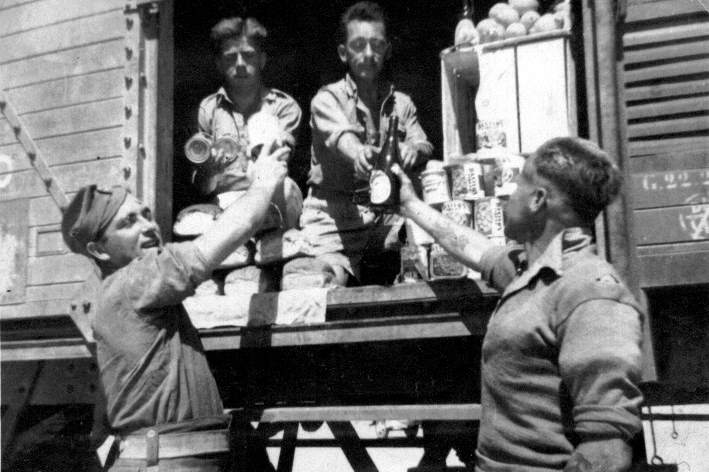
For 90% of the time we were in the Western Desert our main meal consisted of bully beef and hard tack biscuits. The biscuits had to be soaked in water overnight before they were soft enough to eat.
The dehydrated vegetables on offer included leeks, cabbage, potatoes and carrots. Again these had to be soaked overnight in water. Bully beef was then thrown in to make a stew. Sometimes we used a 25 pounder shell casing with a handle attached to pound the biscuits into a powder. The powder was then added to the stew. On most days you could look forward to a plate of bully beef stew in the evening to fill you up.
At times we were offered tinned bacon. This was not the best of food. The bacon had been cut into a long strip, rolled up in paper and then put into a tin. The paper always stuck to the bacon and both had to be cooked together. Only then could the paper be picked off the bacon.
When we were on Railway Defence in the Western Desert, we had an unofficial but superior choice of foodstuff.
In 1940 we were carrying out AA duties on
the
There was a railway running parallel to the canal. On the night the mine was planted, a train had stopped just beside our Gun Post. Three of the Gun Crew went out and inspected the train. The wagons were covered with canvas. These wagons were loaded with cases of South African beer. We managed to carry two of these cases between the three of us. The canal water kept the beer cool." Robin Martin (2004)
"When we were first supplied with dehydrated
cabbage the cook put a complete block into a
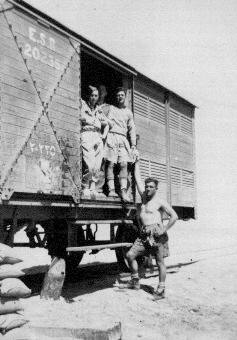
|
Cook
Jim Leighton Mousey Warke and Harold Milford unloading rations |
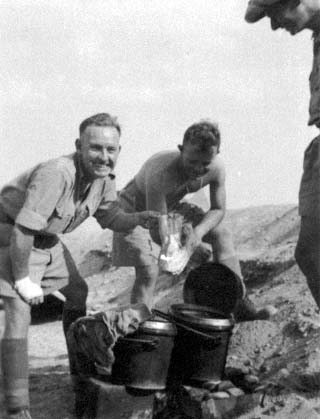
S Leslie & Bobby McDonald Cooking for Nine
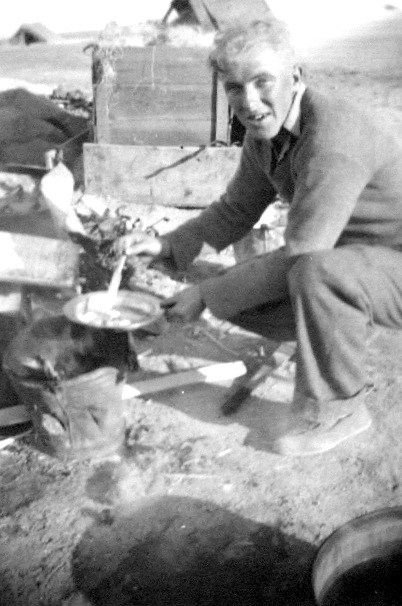
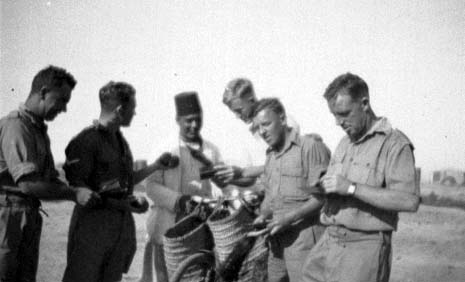
Fruit Sellers -
|
C Walsh R McDonald *** W Patterson T Barr C Connell |
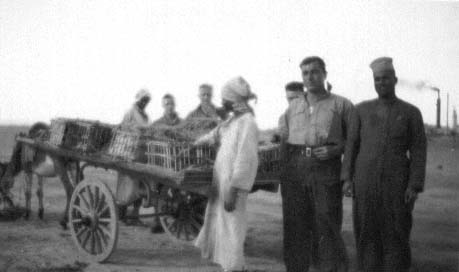
Fruit Sellers -
| J Brogan T Henry H Milford |
"We would buy fresh fruit from the Egyptian tradesmen when the opportunity arose. The baskets they used to carry their fresh fruit were made from 'Banana Bamboo', the same material used on our beds". Spanky McGowan (2004) "These traders also sold us Hen's eggs. They were always hard boiled". Norman Irwin (2004)
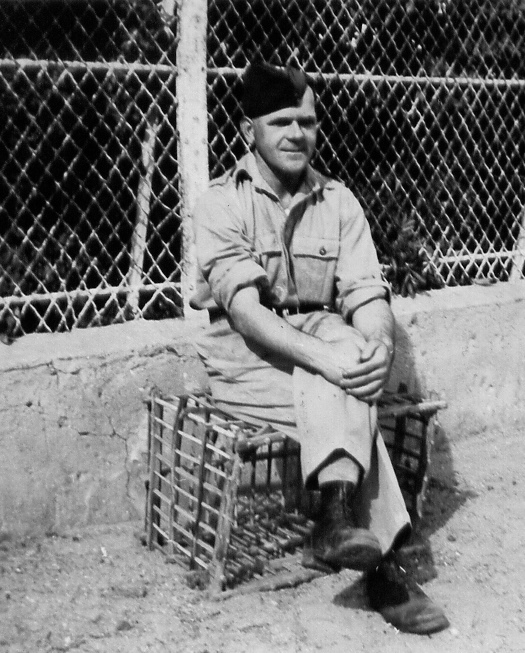
|
Hugh McCandless and the Banana Bamboo Basket |
Water "The drinking water came in a three ton tanker. It was picked up the main water points and taken to each troop. Charlie Burke was responsible for delivering Y Troop their water ration. That was usually one and a half gallons, per man, per day...perhaps, there were days when it never arrived". Spanky McGowan (2004)
"Water was precious. We washed once a week by using a bowl that held one pint of water. You would scrub yourself down with a shaving brush. By the time you reached your waist the water had dried on your body.
"We were at
"Because the German mining activities took place at night, the canal was a quiet spot during the day. Harry Campbell and Abbie Simpson were strong swimmers. They would swim across the canal during the day. I was not as good a swimmer and only ever managed to get three quarters of the way across. There was always the danger of being run down by the Royal Navy motor torpedo boats. They raced up and down the canal at 45 miles an hour." Willie Norris (2004)
"The Germans dropped a mine close to one of the canal gun pits. When the mine was detonated the enormous crater made an excellent diving pool for the gun crews." Norman Irwin (2004)
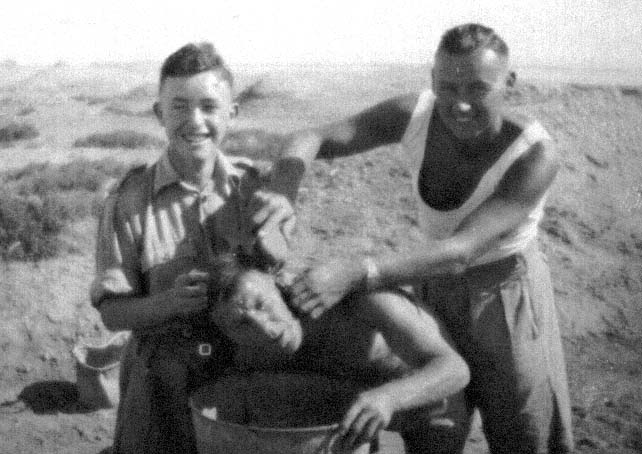
Jim Brogan Tom Dyas Robin Martin 1940
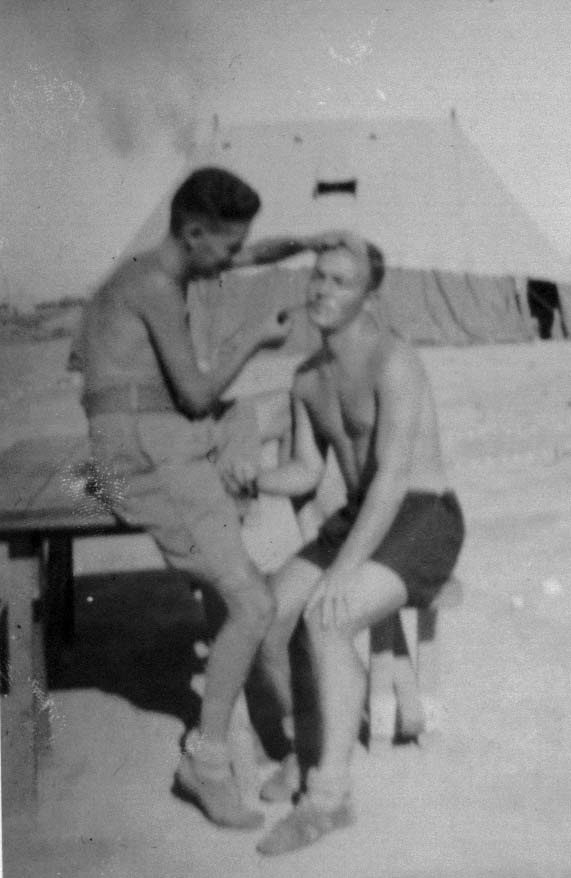
Tom Shaw B McDonald
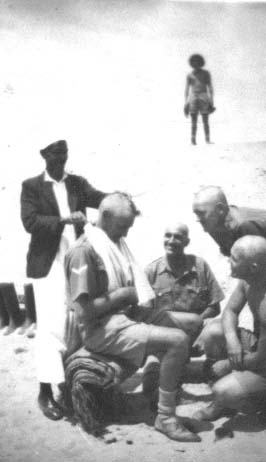
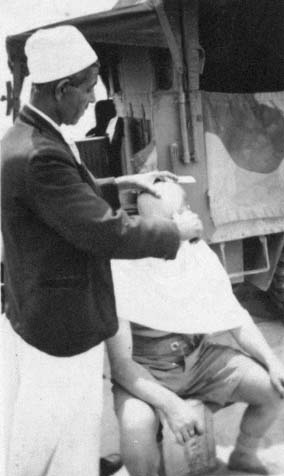
Shaving Off April 1941
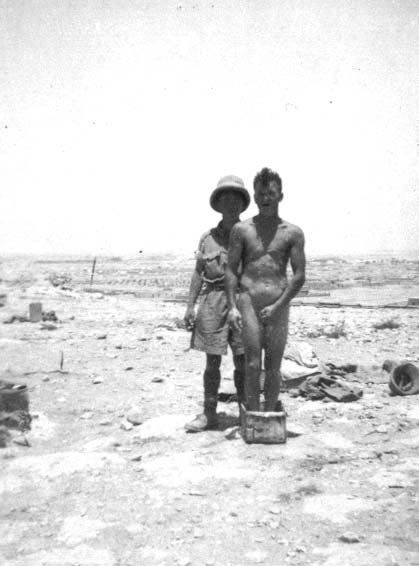
T Barr from Glasgow (and Macfin) and J Brogan from Lancs
Capuzzo May 1942
Petrol Tins "The petrol was issued in four petrol tins strapped together. Each tin held, or was supposed to hold four gallons. A cannery for this job had been built at Port Siad. It was run by a man called Proctor who later worked with me in my home town, Coleraine. The tins were of an inferior quality and sometimes 50% of the contents had leaked out before they reached you. The petrol tins were used for bathing in, carrying water or even cooking in." Norman Irwin (2004)
Wine "We developed a taste for Chianti during our spell on Jock Patrols. Any time we shot up an Italian road party or took over an Italian location there was always a good supply of Chianti. That is why we always celebrate the Battle of El Alamein or toast at the reunions with a couple of bottles of Chianti." Spanky McGowan (2004)
Pay "All soldiers would send money home. We had to do it so that whenever you were killed in action or in an accident, the people you were supporting would receive a war pension. If you did not send money home in the form of an allotment and were KIA, your immediate family would not receive a pension.
The weekly allotment deducted from your pay usually worked out at 70% of one days pay. This amount varied according to your wages. A Lance Corporal was paid Seven Shillings per day, a bombardier was paid Eight Shillings a day and a Sergeant was paid ten shillings a day. The Army pay was at a lower rate than civilian tradesman's pay. For example, a sergeant's pay was only 50% of a tradesman's pay. Despite that situation, we were fed clothed and accommodated for free.
When you went on leave, you had your leave pay in advance and a Ration Allowance.
The money piled up when you were out on patrol. If you were out for thirty days, you were thirty days pay in credit. We had three good pay clerks in Battery HQ. These were Jackie Wallace, Jim Montgomery and Fred Smyth". (A)
Climate "In
Accommodation "In
"At Derna Camp in
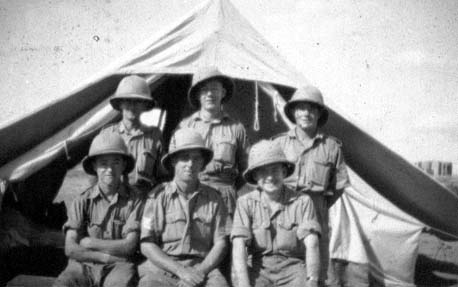
Bedding "Bed Biscuits
were at each base you went to. We used these hard, thin mattresses in
Health and Hygiene "The biggest
curse in
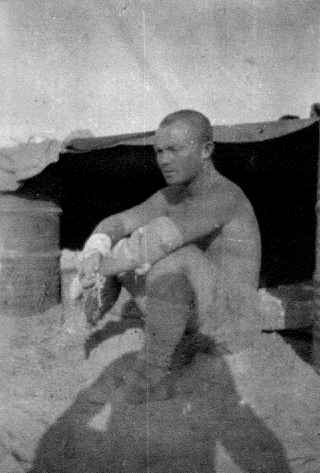
Skin Infection
At one stage of the war I went down with Sand Fly Fever. This looked similar to Malaria". Spankey McGowan (2004)
"Willie Norris nearly died from diphtheria.
I was quarantined twice for diphtheria and once for smallpox. My return trip to
On the same journey, one of the Americans came down with smallpox. The whole ship's compliment and all the passengers had to be inoculated. There were five Coldstream Guards in front of me being inoculated and each one of them winched as the needle was jabbed in. This was because the same needle was being used on all of us, it must have been getting blunt. Anyway, before it came to my turn, the doctor administering the jabs fainted." Norman Irwin (2004)
Toilet Facilities "In order to reduce the incidence of disease, there were stringent rules to follow on using the toilet. When we were in camp, latrines in the form of wooden boxes over a trench were used. On patrol, we had to dig a hole, use it and then apply chemical powders before covering it up. The golden rule was "If you are going on a daily crouch, take a spade". Spanky McGowan (2004)
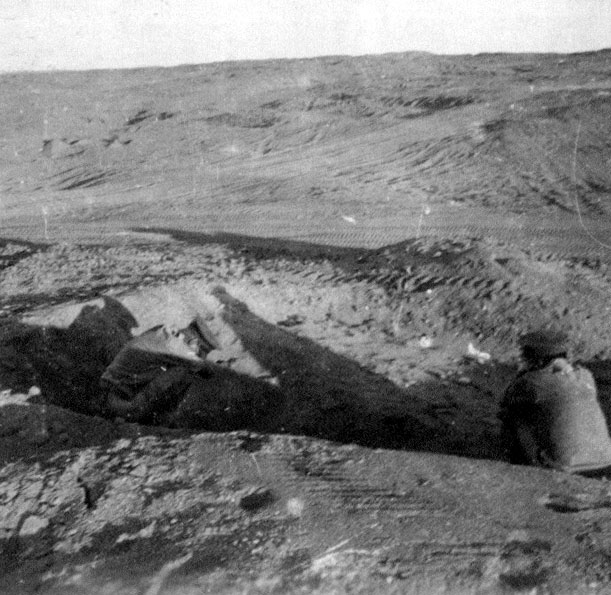
|
W Simpson and J Henry - May 1942 |
Dress The first items of uniform issued to the Battery personnel included overalls, belt and field service cap. (page 23 Doherty 1988) After this initial issue, the Battery personnel were issued with the old issue Service Dress. They did not wear Battle Dress or berets until they were preparing for the Normandy landings.
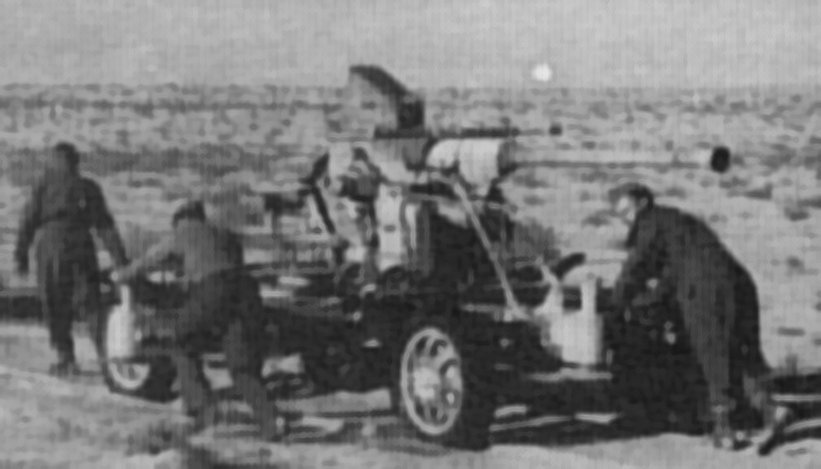
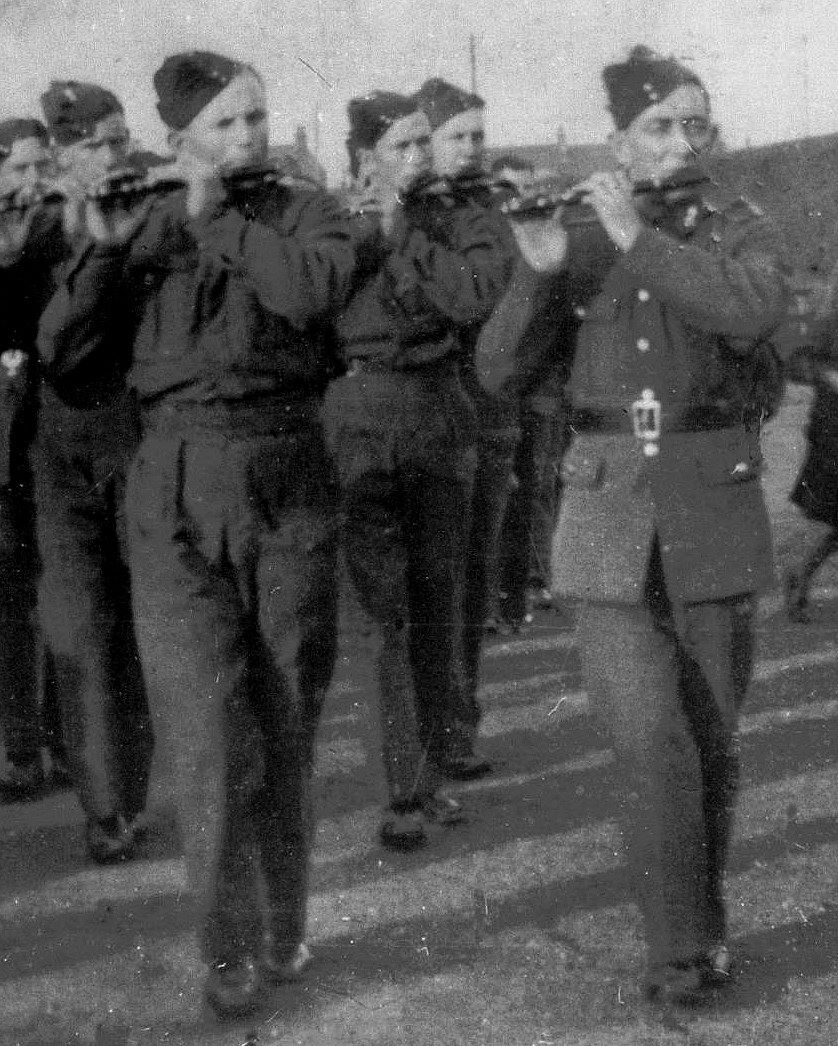
The rear gunner is in his initial issue dress... overalls and service cap...............................Battle Dress and Service Dress
Field Service Marching Order
was the mode of dress and equipment carried by all infantrymen on active
service. It was only used in
"Even in battle we did not make much use of the tin helmet. It would have cooked your head after two minutes in the blazing sun." Norman Irwin (2004)
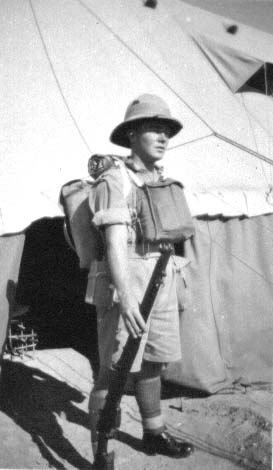
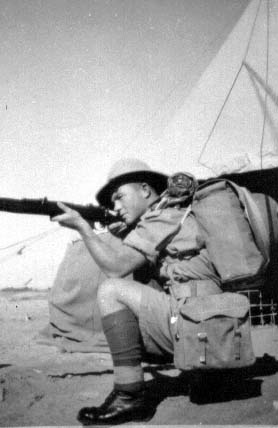
Field Service Marching Order
"Puttees were more preferred than the anklets. The puttees were a close and flexible fit around your ankles and boot tops. This prevented the sand from entering your boots," Spankey McGowan (2004)
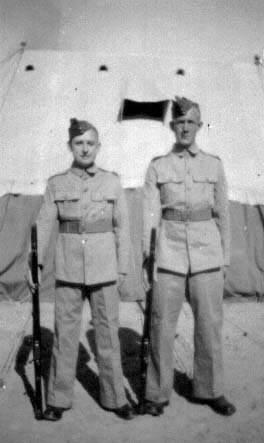
Sammy Leslie & Willie Patterson in Walking Out Dress
Vehicle Security " When we 'laagered up' for any period at all, we always dug out a banking to protect the vehicle engine. We built it up with stones and sand. That way, if we were strafed, no shrapnel or rounds would damage the engine" Robin Martin (2004)
Leave "Leave was a rare
privilege in the
First Aid When we were in the
Jock Columns, at least one trained soldier had to be available to carry out first aid.
Alan Thompson and myself attended a five week Basic First Aid course at the
25th
Sport Other than shooting Germans...The Battery had a good football team. Some of them were in their home town football clubs.

|
Fred
Smythe Jackie Wallace Joe Dunseith Tom Kennedy
|
|
Port
Fouad |

|
Sgt
T Morrison Alex Morrison |
|
Turkington
J Kelso S Gault Billy Corscadden W Kennedy Sammy Rutherford
|
|
Port
Fouad |
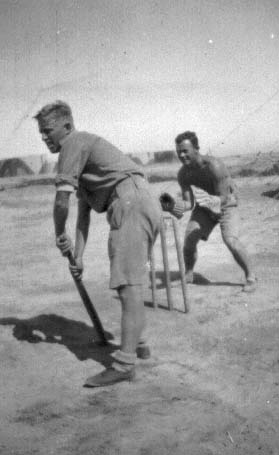
Tom Henry Bob McDonald 1941
Welfare Today you hear about
the modern soldier off on a Cook's Tour of The Falklands or
When Jim Leighton's younger brother was killed in his home town in a traffic accident, Jim was informed. There was no leave or time out to grieve or bury your kin. John Leighton (2004)
Religion "We did hold a Sunday
Service. The
|
The Willie T. McKee J.P. Story
Willie T McKee was born in 1914. He joined the Battery in 1939 at the age of 25. Like his father, he was a qualified Master Butcher and throughout his war service he was primarily employed as a cook in Z Troop. He carried out this duty alongside Walter Richardson from Tobermore. Willie managed to break the monotony of the tinned bully beef and McConaghie's Stew with the occasional goat he had bartered from the desert tribesmen. Willie really excelled himself as a salesman for one of Z Troop's Christmas Dinner in the Western Desert. He stockpiled the dry tea issues and just before Christmas he approached the Arab farmers for a spot of bartering. There he was successful in exchanging the dry tea supply for 5 lambs. Z Troop gunners had a great Christmas Dinner of lamb chops with all the trimmings served up to them by the Troop NCO's. Willie was also a very Christian person and was responsible for conducting the Sunday Service for the Battery when the situation permitted it. On one occasion he preached a 20 minute sermon that had the battle hardened Battery personnel spellbound. At one stage of the Desert War, he constructed a makeshift shelter and called it 'The Benghazi Gospel Hall'.
Willie 1945 After the war, Willie returned to his home town of Maghera and like all his comrades went straight into employment. He ran the family business and had two shops and a home in Maghera. In 1949 he married Ruth McKillen. She was the eldest daughter of the late Pastor George McKillen. The Pastor ministered in Tobermore Baptist Church until his early death in 1930. Willie and Ruth went on to have three daughters, Hazel, Iris and Lorna; their sons were George and David.
Willie was not only gifted with business acumen, he also had a strong social conscience. This was expressed in his Christian convictions and his service to the community he happened to be in. During the war years through Egypt, France, The Netherlands, Belgium and Germany he displayed a steadfastness and caring that endeared him to his comrades-in-arms. Back home in Maghera, his love for his fellow man and infective enthusiasm helped him to resolve many domestic and community problems. His wise counsel was invariably accepted and serious problems were often avoided at a time when his beloved province was torn apart by sectarian and political strife. How do you measure social conscience? Consider the institutions that Willie McKee belonged to and strongly influenced throughout his Christian life.
Annual Remembrance Day Parade - 1984 - Willie is at his bedroom window Willie's wife Ruth died on January 20 1983. Almost two years later, in November 1984, Willie was very ill and unable to attend the annual Remembrance Day Parade. On that particular week he was at his home in Maghera. Willie sat at his bedroom window to listen to the distant parade. Maj. Clarke re-routed the parade that day and halted it outside Willie's house. The Coleraine Old Boys Silver Band, many of whom were his former Desert comrades, played him a tune and then gave him 'Three Cheers' before moving off again. Willie died one month later on December 9, 1984. |
Enemy Munitions
The Italian Breda The Battery made use of the captured Italian 20mm Breda guns for escorting road convoys, Camp Guard and protecting the Alexandria - Mersa Matruh railway.
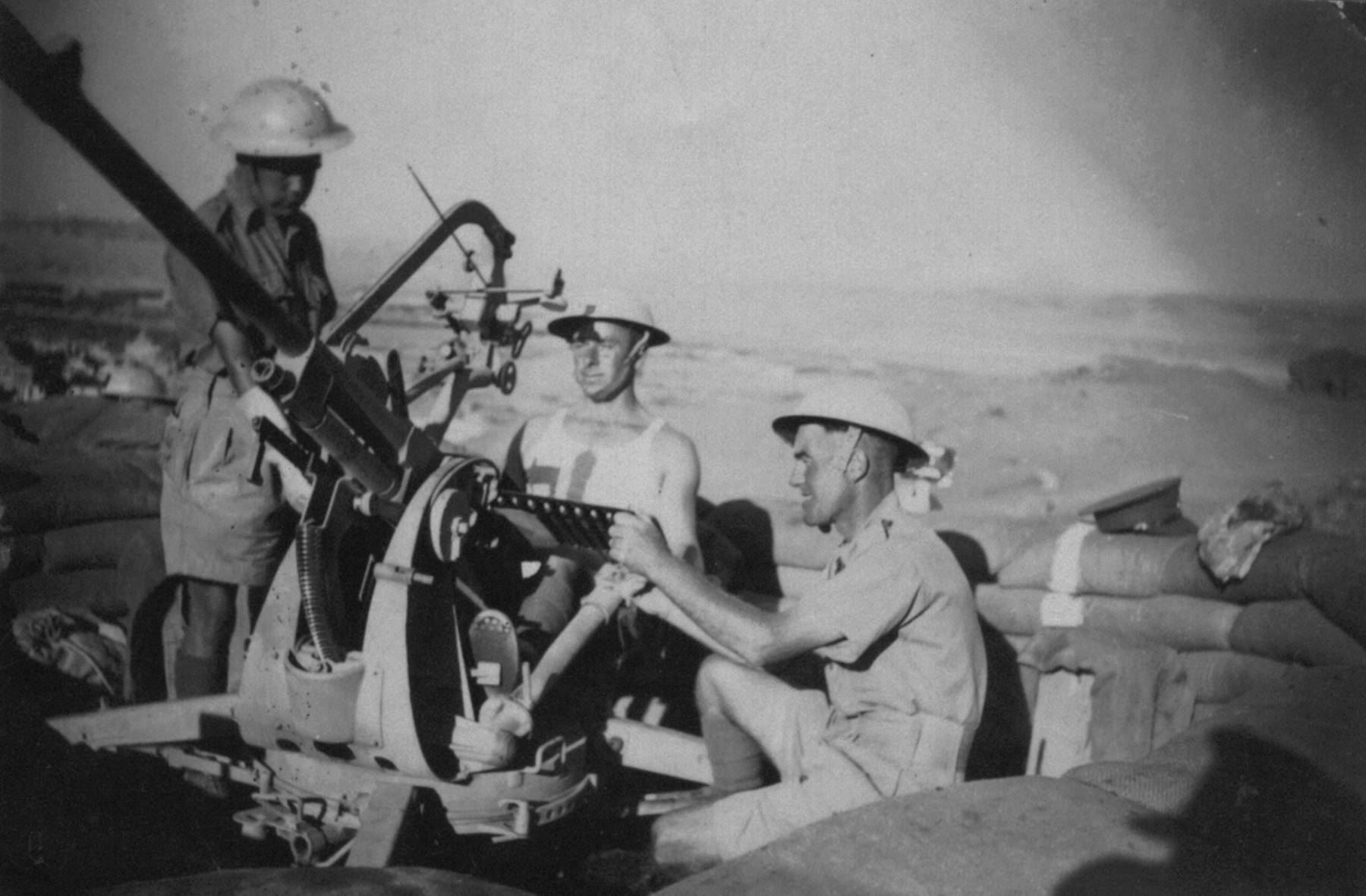
Railway Protection
|
The Captured German
Fieseler
Storch by Willie Norris This story illustrates the tight control of
captured ordnance and equipment exercised on the "I was stationed in Troop HQ at Kilo
38. This was the code name for the Gazala Line near Tobruk. This was on
the 29th May 1942. My job at that time was driver to Lt. P. The day before,
a German plane had landed beside the railway line that was used to
transport the troops to Tobruk. The landing area was covered by Sgt.
Hamill's troop. The pilot alighted and blew up a section of the track. He
then proceeded to shoot at the troop convoys moving along the nearby road into
Tobruk. At this time the pilot had a problem, the ground was too rough for
him to take off again. As far as I know, the pilot made off on foot. Sgt.
Hamill stopped the plane's engine. I drove Lt. P. out to see the plane.
At that time it was being guarded by New Zealanders. He picked up one of the
machineguns and fired it off. It was a rapid fire weapon that sounded like a
roar of thunder when it was fired. Lt P. put the weapon in the back of the
truck and we left it at Troop HQ. We returned the next day to the German plane. A Gloster Gladiator pilot from Air Vice Marshall Sir Arthur Cunningham's group had left a note on the seat. It read, "To whom it may concern. Replace the gun immediately, otherwise action will be taken". We returned the gun just as the Glouster Gladiator returned to the plane with a painter. The painter painted out the German markings and added the RAF roundels. We often saw the plane being used around Kilo 38". (Willie Norris 2004)
Photo 2 John Hamill John Hunter. They were responsible for capturing the plane and stopping the engine. Photo 3 Billy Campbell and Mousey Warke Photo 4 Johnny Hunter Taffy Williams Mousey Warke *** *** John Hamill Willie Campbell Jim Leighton
|
Training If at any time there was a quiet period, we would train. The Sergeant of the gun would take us out on patrol into 'The Blue', (The Desert). He would practice uncoupling, linking up and exercise the gun crew until he was happy with their performance." Spankey McGowan (2004)
Pets "Sam Watt had two Banties when we were in the Western Desert. It was a job and a half to catch them every time we had to mount up and leave the area we were in.
I personally had a chameleon I had found in a desert bush. I left it in the marquee tent where the full gun crew were accommodated. There it kept down all the flies until one day it disappeared.
There were at least three dogs in each Troop. Most of these dogs were from the same bitch, all small lap dogs. Bonzo McClelland used to take his dog onto the gun with him when we were in action. It got that as soon as a dog heard a plane it ran for the gun and sat in one of the seats, looking and barking at where the plane was coming from. On many occasions it was just an enemy Recce plane. All you could see was the vapour trail, much too high for the Bofors to engage." (Anon, 2004)
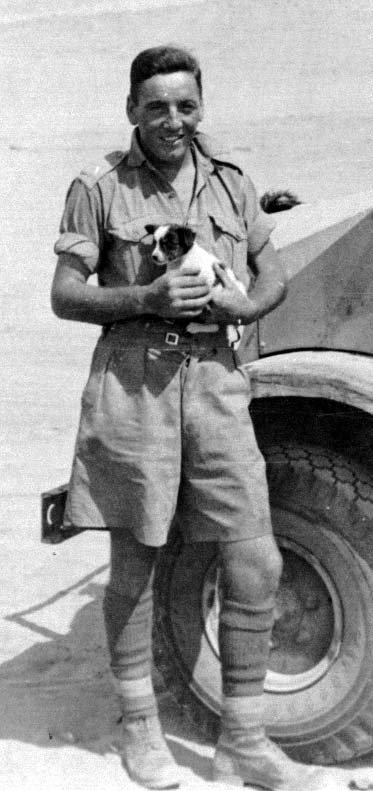
Jock Adams and Patsy
|
|
Gunner T Gamble 1456667 1st LAA Battery 15th Regiment RA MEF Just a few lines hoping to find you well as this leaves meA1 and getting along fine. I had a letter and paper from you this week and glad to see you are having a good time. I wrote to you last week my Air mail to say you could please yourself about going with Sarah or Martha but I'm hoping you don't bother. I also had a letter from Willie and he was saying he would be getting leave shortly and hope to see him then as we have arranged to meet. By the way did you never get the parcel as you should have had it long before this and you never mentioned it in any of your letters so far. It must have taken the card a long time to get home anyway I'm glad you liked it. I have not seen Davy for some time. George and Sammy seem to be having a good time at home. You can tell Mrs. Eaton and Nancy I was asking for them and hope they are very well also everyone at home. Is Martha still there yet and what does Charlie think about it. Willie was saying he left some extra money for Dad and didn't have any word from them about getting it and it's quite a long time since he left it. Do you know if they had any word about it. Hoping to hear from you soon. Yours with lots of love. Tommy |
|
Notes
|
